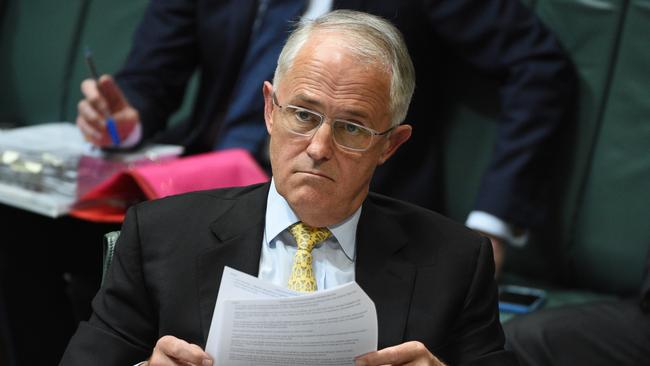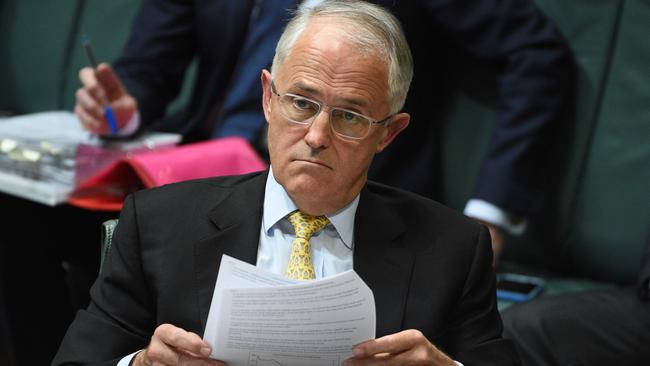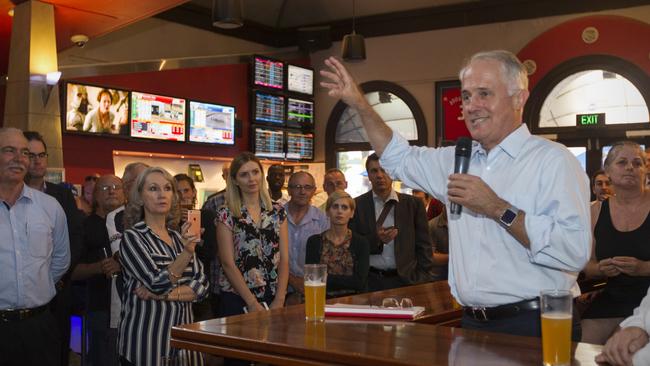Prime Minister Malcolm Turnbull juggling tax reform, budget and election
AFTER just six months as Prime Minister, Malcolm Turnbull has three very big challenges ahead of him — delivering a tax reform plan, a budget, and leading his team to an election. Can he do it?

News
Don't miss out on the headlines from News. Followed categories will be added to My News.
A MIXTURE of joy and relief is what many parents feel when reflecting on the first six months since a baby was born.
Joy at how their lives have been enriched by a little person and relief that they’ve survived the sleep-deprivation and other challenges that parenting a newborn presents.
Of course key milestones, like the baby walking and talking, are still a long way off and it’s natural for parents to sometimes worry about the future.
In reflecting on the first six months of his prime ministership, it would be natural for Malcolm Turnbull to feel a sense of joy about the fact he’s finally doing the job he long dreamt of.
He can feel relieved that he’s so far survived the challenges posed by taking over a government just one year out from a likely election.
But the Prime Minister is yet to pass the key milestones of successfully introducing a tax reform package, handing down a Budget and leading his party to a general election.
Already, the challenges have been many: a bumpy world economy, a budget in deficit, the need to blunt the ideological excesses of the old regime, ministerial misbehaviour and sniping from some Liberal backbenchers.

The PM can take some comfort from the fact that the major public opinion polls have judged the Coalition to be in a position where it is likely to be returned to power at the federal election.
The most important political issue to a majority of Australian voters is the health of the economy and the availability of well-paying jobs.
Mr Turnbull made a good start in this area, selling his belief that Australia is well-placed to be one of the winners from globalisation, exporting goods and professional services The good vibe has had a positive impact on the morale of consumers and business.
The government has emphasised the importance of tax reform to ensuring the health of the economy.
Over the past six months, there has been a strange national tax debate, as the government listened but publicly offered few of its own ideas.
The need to bring the Budget closer to surplus makes difficult the idea of tax changes which reduce revenue.
The idea of a higher GST, which would have funded cuts to personal and business tax cuts, was dangled in front of voters and then snatched away.
Negative gearing reform was hinted at, then the government played down the chances of significant changes to the system of tax breaks for property investors.

Business leaders, economists and voters have been puzzled by the paucity of clues given by the government as to what will be in the tax reform system.
The government is still keeping the public guessing about whether the date of the federal Budget will be dragged forward by a week, setting the scene for Australia's first double dissolution election since 1987, on July 2.
Now that he has the prime ministership, Mr Turnbull seems content to drive reform at his own pace, not in the time frame demanded by commentators
Former South Australian senator and Howard-era minister Amanda Vanstone this week argued the public and the media need to get used to a new (or perhaps retro) type of prime ministership, with fewer Kevin Rudd-style daily announcements designed to demonstrate how busy the government is.
The two policy areas where Mr Turnbull has already shown himself willing to publicly take risks are being fought out in the Senate.
Firstly, he has been willing to antagonise minor party senators by proposing changes to voting laws which will see most of them lose their seats.
With the help of the Greens, those changes should be passed by the Senate this week.
Secondly, Mr Turnbull has indicated he is willing to call a double dissolution election if the Senate fails to pass laws designed to help clean up the union movement.
The Prime Minister has to take more risks over the next few months. If they pay off, he will win a public mandate to continue as the nation’s leader for another three years.
If they don’t, July 2 could be the date Mr Turnbull’s time as Prime Minister is cut short after less than 10 months.
WHAT TURNBULL HAS ACHIEVED
BOOSTED confidence about opportunities for the economy
RELEASED a $1.1 billion innovation package to ensure workers and businesses can compete in the global economy
FINALISED the Defence policy White Paper, including ambitious plans for the Defence manufacturing sector
TAKEN some of the heat out of public discussions about terrorism while continuing to address the threat
INTRODUCED $100 million Women’s Safety Package to combat domestic violence
FINALISED free trade deal with China
CUT deal with the Greens and independent Senator Nick Xenophon to overhaul Senate voting laws
STILL ON HIS TO-DO LIST
PUBLISH and convince the public of the value of a proper tax reform package
REVEAL how much of the construction of Australia’s 12 new navy submarines will occur in Adelaide
REACH an agreement with the states and territories about how they can access sufficient revenue to fund growing health and education costs
FINALISE plans for a plebiscite on same-sex marriage and a referendum on recognising indigenous Australians in the Constitution
FIND a way to ensure universities are financially sustainable
PERSUADE the Senate to pass Building Construction Commission and registered organisations Bills


